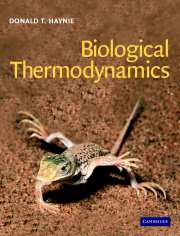
-
Select format
-
- Publisher:
- Cambridge University Press
- Publication date:
- 31 May 2010
- 01 March 2001
- ISBN:
- 9780511754784
- Dimensions:
- Weight & Pages:
- Dimensions:
- Weight & Pages:
You may already have access via personal or institutional login
Book description
Biological Thermodynamics provides an introduction to the study of energy transformations for students of the biological sciences. Don Haynie uses an informal writing style to introduce this core subject in a manner which will appeal to biology and biochemistry undergraduate students and be relevant to their studies. The emphasis is on understanding basic concepts and developing problem-solving skills throughout the text, but mathematical complexity is kept to a minimum. Each chapter comprises numerous examples taken from different areas of biochemistry, as well as extensive exercises to aid understanding. Topics covered include energy and its transformation, the First Law of Thermodynamics, the Second Law of Thermodynamics, Gibbs Free Energy, statistical thermodynamics, binding equilibria and reaction kinetics, concluding with a survey of the most exciting areas of biological thermodynamics today, particularly the origin of life on Earth.
Reviews
‘Reducing the living world down to the laws of physics is a challenge that has occupied some of the greatest minds. Providing a text which enables the rest of us to understand this work is a challenge of a very different kind. In this work Dr Haynie has conquered this challenge and provided a readable and digestible text on a subject area which is notoriously difficult to communicate. Dr Haynie’s approach has been to weave the theory of thermodynamics into a book which is decorated with a wealth of examples of application to the living world, as well as an historical and philosophical context. The book is extremely well referenced with citations from texts from ancient civilisation to the present day, including most of the great scientists and thinkers of the ages. The book will serve the requirements of the student biophysicist, biochemist and biotechnologist enabling them to delve into specific areas for rapid reference, to refer to detailed sections explaining complex thermodynamic principle around which to construct essays, and finally provide a very good, entertaining and informative read.’
Dr John Ladbury - University College London
‘Congratulations on producing a refreshingly readable thermodynamics book. The next generation of students should be extremely grateful for it.’
Dr Peter Budd - University of Manchester
‘Here at a last is a textbook written by an expert in thermodynamics specifically for students of biology, who are guided gently, with the help of familiar, concrete examples, into a thorough understanding of the abstract concepts of thermodynamics and how to apply them.’
Dr Derek Bendall - University of Cambridge
‘In my opinion, the author has covered a traditionally ‘boring field’ with vivid description and interesting examples. My overall impression is that this book is comprehensive, illustrative and up-to-date … And I would certainly recommend it to my graduate students.’
Professor Yigong Shi - Princeton University
‘… an outstanding supplement to the treatment offered in most textbooks of biochemistry … very rewarding for students majoring in biochemistry, biophysics, or biotechnology.’
F. Vella Source: Biochemistry and Molecular Biology Education
Contents
Metrics
Altmetric attention score
Full text views
Full text views help Loading metrics...
Loading metrics...
* Views captured on Cambridge Core between #date#. This data will be updated every 24 hours.
Usage data cannot currently be displayed.
Accessibility standard: Unknown
Why this information is here
This section outlines the accessibility features of this content - including support for screen readers, full keyboard navigation and high-contrast display options. This may not be relevant for you.
Accessibility Information
Accessibility compliance for the PDF of this book is currently unknown and may be updated in the future.


